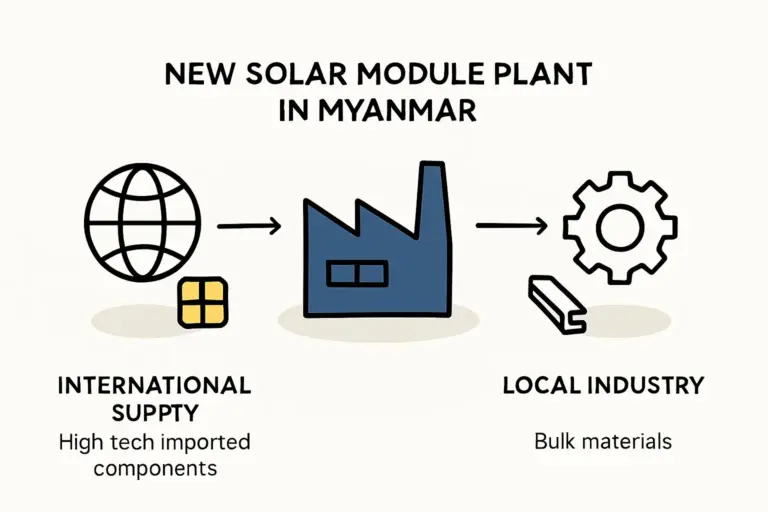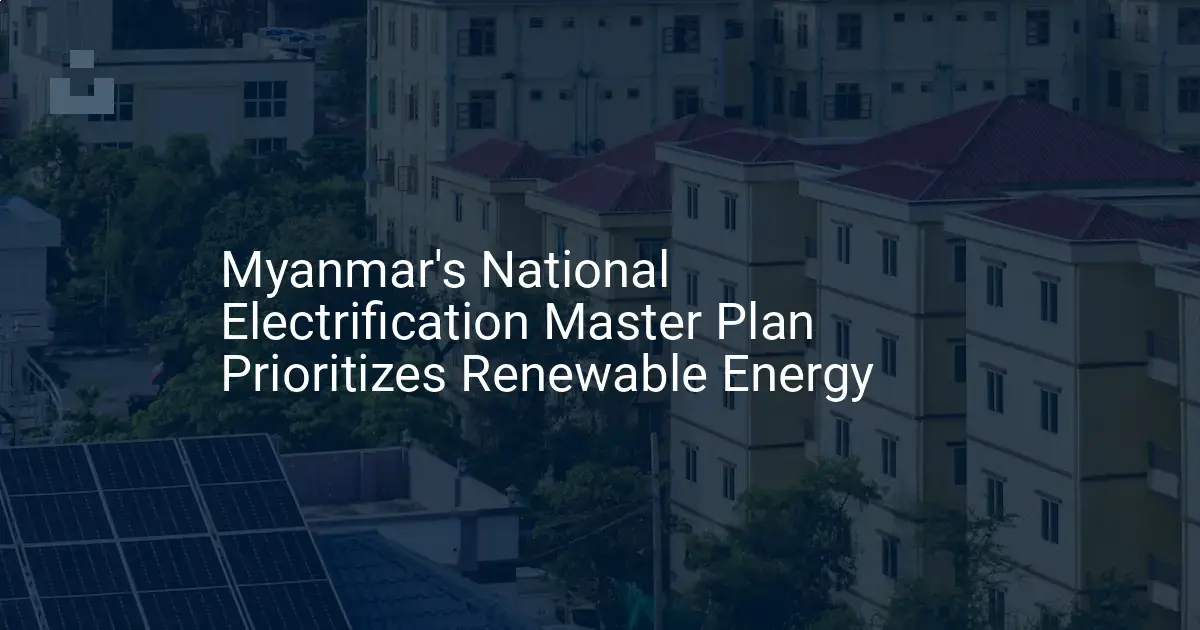When an entrepreneur considers a significant industrial investment in a new country, the first questions are often the most fundamental: How can we secure a location? What are the rules for foreign ownership?
These questions are especially critical in Myanmar, a market with considerable potential for solar energy development. An investor might see the opportunity but hesitate when faced with the complexities of local regulations, particularly those concerning land.

While foreign nationals cannot directly own land in Myanmar, the country has established a clear and robust legal framework to attract and protect long-term industrial investments. This framework, centered on long-term lease agreements, provides the stability required to build and operate a solar module manufacturing facility. Understanding these regulations is the first step toward transforming a business concept into a tangible operation.
The Foundation: Understanding Myanmar’s Investment Framework
Foreign investment is primarily governed by the Myanmar Investment Law (MIL) of 2016. This law was specifically designed to create a more transparent and favorable environment for both local and foreign investors.
At the heart of this framework is the Myanmar Investment Commission (MIC), the key government body responsible for verifying, approving, and overseeing most foreign investment projects. For any significant industrial undertaking, such as setting up a solar factory, engaging with the MIC is an essential first step. The MIC’s approval provides the official green light for a project, including the terms for land use.
A key principle for foreign investors is that the system is built on land usage rights, not ownership. This distinction is crucial, as it shifts the focus from purchasing property to securing a long-term, legally enforceable lease that protects the investor’s interests over the project’s entire lifecycle.
Securing Your Location: Long-Term Land Lease Agreements
For a capital-intensive project like a solar module factory, investment security is paramount. The MIL addresses this through long-term land leases that provide the necessary timeframe to build, operate, and generate a return on investment.
Standard Lease Terms and Conditions
Under an MIC Permit, a foreign investor can lease land for an initial period of up to 50 years. This initial term provides a substantial timeframe for business planning and operations.
The law also includes provisions for extending this lease. After the initial 50-year period, investors can apply for two consecutive 10-year extensions, bringing the total potential lease duration to 70 years. This long-term structure is designed to give foreign companies the confidence to commit to significant infrastructure and capital expenditure. Based on experience from J.v.G. turnkey projects, a 70-year timeline is more than sufficient for the operational life of several generations of solar module production lines.
The Strategic Advantage of Special Economic Zones (SEZs)
For many industrial investors, Myanmar’s Special Economic Zones (SEZs) offer an even more attractive proposition. These designated areas are developed to concentrate industrial activity and provide superior infrastructure and streamlined administrative services.
The primary SEZs in Myanmar include:
- Thilawa SEZ
- Dawei SEZ
- Kyaukphyu SEZ
Investing within an SEZ can offer several key advantages. First, the infrastructure for power, logistics, and utilities is often more reliable and developed than in other regions. Second, the lease terms can be even more generous. In certain SEZs, investors may be granted an initial 50-year lease with the possibility of a 25-year extension, for a total of 75 years. This enhanced security, combined with a more predictable operational environment, makes SEZs a primary consideration for planning a new factory layout and design.

Structuring Your Business: Foreign Ownership Options
Alongside securing land, establishing the appropriate corporate structure is another key priority. The MIL provides two primary pathways for foreign investors to establish a legal presence in Myanmar.
The 100% Foreign-Owned Company
This is the most direct structure for investors who wish to maintain complete control over their operations, strategy, and equity. By establishing a wholly-owned subsidiary, the foreign parent company retains all decision-making authority. This structure is common for businesses with proprietary technology or those committed to implementing global operational standards without compromise. Setting up a 100% foreign-owned entity requires an MIC Permit, which formally sanctions the investment.
The Joint Venture (JV) with a Local Partner
An alternative and often strategic option is forming a joint venture with a Myanmar-based company or individual. In a JV, the foreign partner can hold a significant majority stake. This collaborative approach can offer significant advantages, particularly for entrepreneurs new to the region.
A local partner can offer deep knowledge of the domestic market, established business networks, and practical experience navigating local administrative processes. This can significantly reduce ramp-up time and help avoid common pitfalls. While this approach means sharing equity, a well-chosen JV partner can accelerate market entry and de-risk the investment.

Frequently Asked Questions (FAQ)
Can I buy land in Myanmar as a foreigner?
No, the law does not permit foreign nationals or foreign-owned companies to own land directly. The established legal mechanism for securing a site for your factory is a long-term lease agreement, approved and regulated by the Myanmar Investment Commission (MIC).
What is the maximum possible lease term for an industrial project?
Under standard regulations, the total lease period is up to 70 years (an initial 50-year term plus two 10-year extensions). Within a designated Special Economic Zone (SEZ), this may extend to 75 years.
Is my investment secure with a lease instead of direct ownership?
Yes. The Myanmar Investment Law of 2016 provides a strong legal basis for these long-term leases. The rights granted under an MIC-approved lease are legally protected and can be mortgaged or transferred with prior approval from the commission, providing a high degree of investment security.
Which is better: a 100% foreign-owned company or a Joint Venture?
The ideal structure depends on your business strategy. A 100% foreign-owned company offers maximum control. A Joint Venture provides access to local expertise and networks, which can be a significant advantage in a new market. A thorough business plan for a solar factory should evaluate the pros and cons of each approach.
What is the primary role of the Myanmar Investment Commission (MIC)?
The MIC is the central government body responsible for reviewing and approving foreign investment proposals. It issues the necessary permits that allow a foreign entity to operate, lease land long-term, and benefit from the protections and incentives offered under the Myanmar Investment Law.
Building a Solid Legal Foundation for Your Project
Navigating the legal landscape of a new market is a crucial part of any successful industrial venture. In Myanmar, the framework is clear: while land ownership is reserved for nationals, the system of long-term leases—up to 70 or 75 years—is purpose-built to provide foreign investors with the security needed for large-scale projects like solar module manufacturing.
Understanding the roles of the Myanmar Investment Law and the MIC, and carefully considering the strategic choice between a wholly-owned entity and a joint venture, allows an entrepreneur to build a solid legal and operational base. This initial due diligence is a non-negotiable step in understanding the full scope of investment requirements for a solar module factory and setting the stage for long-term success.





